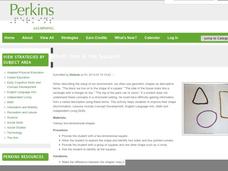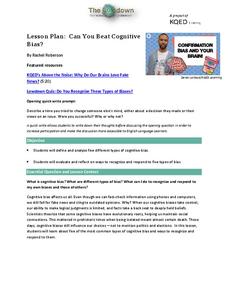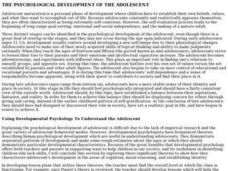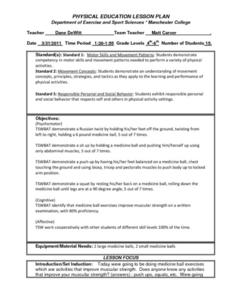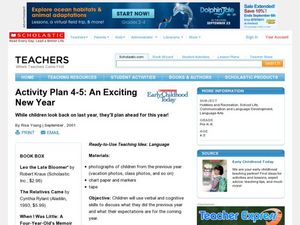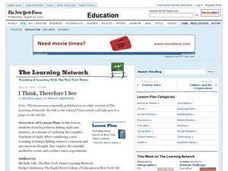Perkins School for the Blind
Following Directions
Turn the act of following directions into a fun and engaging game! Especially designed for students with cognitive or intellectual disabilities, this lesson uses a game format as a natural reinforcer. Write a set of directions onto a set...
Perkins School for the Blind
Silly or Sensible?
Is it silly or sensible? That's a great question, and it's the question that will drive this entire lesson. Learners with special needs and visual impairments work together to analyze verbal information. The instructor makes a statement,...
Perkins School for the Blind
What Would You Do If...?
What would you do if...? That's a great question, and, when posed to learners with visual impairments, a question that can foster concept development and speaking and problem-solving skills that relate to real-life situations. The...
Perkins School for the Blind
Treasure Hunt
On, over, and under are some very common prepositions; but how can you teach these concepts to children with visual impairments? Here, is one way. Kids will practice following verbal commands as they go on a classroom treasure hunt. They...
Perkins School for the Blind
Where Shall I Put It?
Position and positional phrases are concepts that need to be constructed for learners with low or no vision. Help them gain competence and a conceptual understanding of words like on, in, and under with a funny game. After gathering a...
Perkins School for the Blind
Mix and Match
Sorting and matching are skills that have all kinds of applications. Learners with low, but useable vision work to match an object to an object, an object to a picture, and a picture to a picture. This will help them identify objects...
Perkins School for the Blind
Which One is the Square?
Children who are blind need to constantly be engaged in building conceptual understandings of the world around them. This activity will help them grasp the concept of shape, identify shapes, and consider shapes as they are used to...
Perkins School for the Blind
Calendar Bingo
While this activity was designed for students with special needs, it could be used with any group learning about the calendar or days of the week. Old calendar pages become the bingo board, and numbers 1 through 31 become the numbers...
Curated OER
Teaching to Enhance Development and Learning
Pupils engage in a lesson that prepares Preschool Teachers to teach lessons targeted at the development of children in the area of learning. They view a PowerPoint presentation to obtain the new information and the visual learning is...
NPR
Can You Beat Cognitive Bias?
In a time of fake news, media manipulation, and Internet trolls, a resource equips learners with the tools they need to recognize and combat resources that are designed to appeal to our cognitive biases. Introduce learners to five...
Perkins School for the Blind
Beanbag Toss
Why is learning how to catch and toss so important? If one has visual impairments, learning this basic skill will help him increase orientation and mobility, coordination, and cognitive development,. Mastery of this skill will also mean...
Curated OER
The Physiological and Psychological Development of the Adolescent
Students examine the life of a teenager from their own perspective and an adult's. In groups, they focus on the biological changes and how they are different in a girl and a boy. Individually, they write a paper about these changes and...
Curated OER
How Do Artists Get Their Ideas? Culture and Environment as Sources of Ideas
Young scholars share the difficulties they have in determining what to write or draw for a project. In groups, they view examples from three different artists and discuss how their personal experiences affected their art. They...
Curated OER
Moral Development: Lawrence Kohlberg
Learners study the stages of moral development. In this psychology lesson, students explore Lawrence Kohlberg's stages of moral development as they read, respond to, and evaluate a moral development scenario.
Curated OER
Human Growth and Development in Middle Adulthood
Students identify the differences between the transition model and the crisis model of midlife, and the myths associates with the latter. They describe cognitive and physical continuity and change in middle adulthood. Studnets compare...
Curated OER
Physical Education Lesson Plan - Medicine Ball
Use the medicine ball to help young learners develop strength in the core muscle groups. The Russian twists develop oblique strength, push-ups develop triceps strength, sit-ups work on abdominal strength, and squats develop quadriceps...
Curated OER
Taking Care of a Baby
Pupils are introduced to the basics of human development and the critical role of parents in taking care of a newborn.
Curated OER
Taking Care of a Baby
Students explore the basics of human development and the critical role of parents in taking care of a newborn.
American Psychological Association
Using Psychological Perspectives to Answer Questions on Behavior
Perspective is everything when it comes to assessing human behavior. Class members examine a series of statements and identify the perspective represented by each to demonstrate their understanding of different psychological perspectives.
Curated OER
The Cold War and Development of Post-War America
Students view examples of political advertisements during the years of 1952 through 1964. After viewing, they discuss how the Cold War and the threat of Communism affected the development of the United States. They compare the Cold War...
University of Maine
Don’t Fall Into the Thinking Trap
The final lesson in a three-part healthy living series has class members examine five thinking traps that distort how they perceive themselves and/or situations. They also learn strategies that help stop the downward spiral and get them...
Curated OER
An Exciting New Year
Students look back on last year, so that they are able to plan ahead for a new year. In this early childhood language arts lesson, students use verbal and cognitive skills to discuss what they did the previous year and what their...
Curated OER
Tadpoles
Young scholars examine tadpoles at various stages of development. Questions in observation category assess students' ability to use a variety of senses to observe data in a certain way-scientific way.
Curated OER
I Think, Therefore I See
Learners participate in a memory experiment to discover how the eye works. After reading an article, they analyze a new technique which examines how the brain registers sight. They develop their own memory game and conduct trials using...








